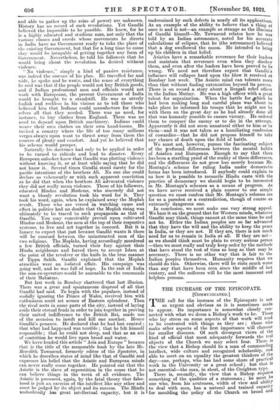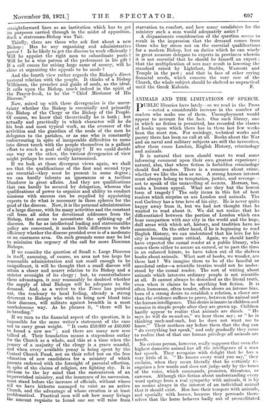T HE call for the increase of the Episcopate is not
so urgent and obvious as it is sometimes made to appear. Its importance is somewhat closely con- nected with what we deem a Bishop's work to be. Those who lay stress on some aspects of that work will tend to be contented with things as they are ; those who make other aspects of the first importance will clamour for smaller dioceses. Of such divergent views of the kind of official that most we forwards the real objects of the Church we may select four. There is the view that a Bishop should be a man of commanding intellect, wide culture and recognized scholarship, and able to meet .on an equality the greatest thinkers of the day—one, perhaps, who has had some share of practical work in the University or a great school ; but that is not essential—the man, in short, of the Creighton type: There is, secondly, the view that a Bishop requires something of the qualities of a statesman ; ho must be one who, from his acuteness, width of view and ability to deal with men, has a natural and trained capacity for moulding the policy of the Church on broad and straightforward lines as an institution which has to get its purposes carried through in the midst of opposition. Such a statesman-Bishop was Tait.
Thirdly, there are those who ask first about a new Bishop : Has he any organizing and administrative ewer 3 Is he likely to get the diocese to work efficiently ? ill he appoint the right men to subordinate posts ? Will he be a wise patron of the preferment in his ? If a call comes for raising large sums of money, willhe shine at organizing the appeals to be made ?
And the fourth view rather regards the Bishop's direct pastoral relation with the people. It thinks of a Bishop Wilkinson, the preacher and guide of souls, as the ideal. It calls upon the Bishop, much indeed in the spirit of the Prayer-book, to be the " Chief Missioner of His Diocese."
Now, mixed up with these divergencies is the uncer- tainty whether the Bishop is essentially and primarily the Bishop of the Clergy or the Bishop of the People. Of course, we know that theoretically he is both ; but actually and practically in which character will he do his best and most typical work, as the overseer of the activities and the guardian of the souls of the men he delegates to the parishes, or as one who is constantly endeavouring in spite of insuperable difficulties to come into direct touch with the people themselves in a gallant effort to reach a goal of ubiquity ? If we could decide one way or the other, the various divergencies of view might perhaps be more easily harmonized.
If we look at those divergent views again, we shall see that the qualifications of the first and second type aro essential—they must be present in some degree ; we can hardly tolerate an ignoramus or a tactless blunderer in great affairs. And they are qualifications that can hardly be secured by delegation, whereas the qualifications of power to organize and ability to conduct missions with success can be supplied by appointing experts to do what is necessary in these spheres for the good of the diocese. Now, it is the personal administration of a large diocese, with its many activities and the constant call from all sides for devotional addresses from the Bishop, that seems to necessitate the splitting-up of dioceses. So far as intellectual leading and statesmanlike policy are concerned, it makes little difference to their efficiency whether the diocese presided over is of a moderate or an enormous area. On such grounds some may be led to minimize the urgency of the call for more Diocesan Bishops.
If we consider the question of Small v. Large Dioceses in itself, assuming, of course, an area not too large for reasonable administration and not small enough to be insignificant, it will be thought that a small diocese will attain a closer and nearer relation to its Bishop and a stricter oversight of its clergy ; but, to counterbalance these advantages, it may reasonably be doubted whether the supply of ideal Bishops will be adequate to the demand. And, as a writer to the Times has pointed out, the tendency to local feeling, already a strong deterrent to Bishops who wish to bring new blood into their dioceses, will militate against breadth in a most unwholesome way. As he phrases it, " there will be in-breeding."
If we turn to the financial aspect of the question, it is impossible for the same writer's statement of the case not to carry great weight. " It costs £50000 or £60,000 to found a new see ' ; and there are many new sees talked of. Their foundation means a stupendous outlay for the Church as a whole, and this at a time when the Penury of a majority of the clergy is a grave scandal, and when every available penny is being spent by the Central Church Fund, not on their relief but on the free education of new candidates for a ministry of which parents endowed with the foresight of parental affection, in spite of the claims of religion, are fighting shy. It is obvious to the lay mind that the sustentation of an impoverished ministry, and the insurance of its succession, must stand before the increase of officials, without whose aid we have hitherto managed to exist as -an active Church, and the advantage of whose creation is at least problematical. Practical men will ask how many livings the amount requisite to found one see will raise from starvation to comfort, and how many candidates for the ministry such a sum would adequately assist ? A dispassionate consideration of the question seems to result in the impression that the demand comes from those who lay stress not on the essential qualifications for a modern Bishop, but on &ties which he can wisely in great measure delegate to experts in provinces wherein it is not essential that he should be himself an expert ; that the multiplication of sees may result in lowering the standard raised by Lightfoot, Stubbs, Westcott and Temple in the past ; and that in face of other crying financial needs, which concern the very esse of the Church, the whole subject should be shelved as unpractical











































 Previous page
Previous page